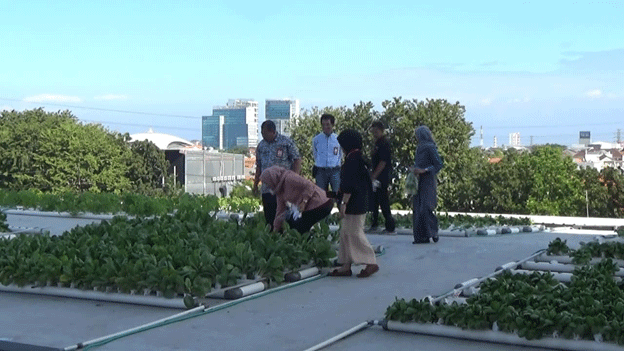Urban farming has become an increasingly popular solution to the challenges of limited space in densely populated cities. In a remarkable example of this trend, the University of 17 August 1945 Surabaya (Untag Surabaya) has taken to the rooftops, transforming unused space into a productive hydroponic garden.
This rooftop hydroponic garden, located atop a campus building, is home to a variety of vegetables, including water spinach, spinach, mustard greens, lettuce, and pak choi. The garden’s innovative design makes use of PVC pipes, which are filled with water and nutrients to support the plants’ growth. According to Bandot Sutriono, the Vice Dean of the Faculty of Engineering at Untag Surabaya and the coordinator of this project, the entire process from planting to harvest takes approximately 29 days.
Hydroponic systems, which grow plants without soil by using mineral nutrient solutions in a water solvent, are particularly well-suited to urban environments where space is scarce. By utilizing rooftops, Untag Surabaya has managed to cultivate a garden with 1,600 planting holes, yielding vegetables that weigh between 2 to 4 ounces per bundle. This method not only maximizes space but also ensures that the produce is of high quality and free from harmful pesticides.
The adoption of hydroponic farming at Untag Surabaya serves multiple purposes. Primarily, it aims to educate students and staff about modern agricultural techniques, equipping them with practical skills that are increasingly relevant as urbanization continues to rise. Additionally, the project turns otherwise unused rooftop space into a productive agricultural area, contributing to food security and providing a source of fresh, locally-grown vegetables.
The vegetables harvested from this rooftop garden are sold at prices ranging from 3,000 to 5,000 IDR per bundle. The produce has been well-received by the campus community, with many staff members choosing to purchase the vegetables due to their perceived health benefits and the assurance that they are pesticide-free. One staff member, Hima, expressed her enthusiasm, noting that the produce is not only affordable but also more hygienic than what is typically available in local markets.
Looking ahead, Untag Surabaya plans to expand its rooftop hydroponic gardens across more campus buildings and introduce additional crops such as eggplants, tomatoes, and melons. This expansion will not only increase the variety of produce available but also further enhance the university’s role as a leader in urban farming innovation.
The rooftop hydroponic garden at Untag Surabaya exemplifies how urban spaces can be creatively repurposed to support sustainable agriculture. By integrating education with practical farming techniques, the university is fostering a new generation of agronomists and engineers who are well-equipped to address the challenges of urbanization and food production.












